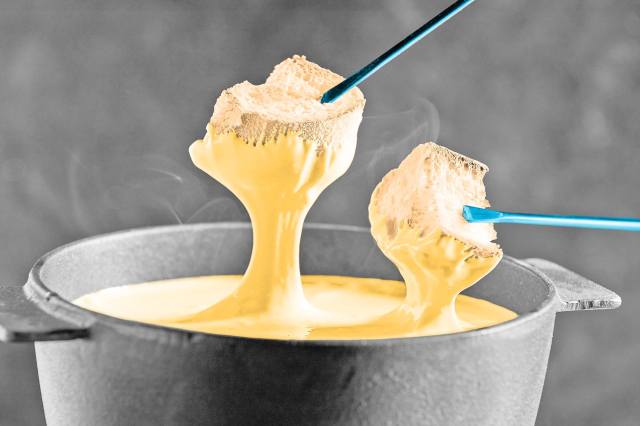
Sweetbreads
Sweetbreads sound like dessert, but they’re actually a kind of offal, or organ meat — specifically the thymus and pancreas glands, usually from a lamb or calf. The meat is soaked in milk, buttermilk, or water before cooking. Sweetbreads reduce waste from a butchered animal, and many still enjoy the dish, but it’s not as common as it used to be. (Consumption of organ meats in general declined in the U.S. after World War II, although they’re making a bit of a comeback.)

Fruitcake
Another highly controversial holiday dish is the much-maligned fruitcake, a cake with candied fruits and nuts that’s usually soaked in a spirit like brandy. Fruitcake has ancient roots, but fell into deep disfavor in the U.S. around the 1980s and eventually became a sort of joke, emblematic of the worst holiday gift. Without any fans to give or receive it, the fruitcake has faded into relative obscurity stateside, though it’s still common in some other countries.
Ambrosia, or Five-Cup Salad
Named for the preferred food of the Greek gods, the most divisive dish of the holiday season used to be ambrosia, sometimes called five-cup salad or, simply, fruit salad with marshmallows. It’s a mixture of mini marshmallows, canned (sometimes fresh) fruit, mayonnaise or Cool Whip or sour cream, and coconut. It tastes about how you’d expect it to, for better or for worse.

Savory Jell-O Salads
Nothing screams retro dinner party quite like a centerpiece savory gelatin salad, molded into an elaborate shape and often with showy colors. It wasn’t just sturdy vegetables that appeared in these concoctions — everything from lettuce to ham to ranch dressing could be made into jiggly edible art. Jell-O salads hit their peak in the 1950s and 1960s, although they stayed on the table in many households, especially in the South, for decades after.
Fondue
Fondue, a shared, heated cheese dip served in a special warming pot, was all the rage at parties in the 1970s. While you can sometimes find fondue in restaurants, it’s a pretty niche item now — and since single-function items like fondue pots take up valuable cabinet space in one’s home, it’s an extremely rare sight at parties.
More Interesting Reads

Liver and Onions
Liver and onions are a classic, hearty combination, pairing beef or veal liver with soft-cooked or caramelized onions, often with a side of mashed potatoes. It’s now considered a little old-school, and many people in younger generations associate it more with a Simpsons joke than their dinner tables.
Salisbury Steak
Salisbury steak — named for its inventor, 19th-century doctor James Henry Salisbury, who advocated a meat-heavy diet — is not so much a steak as a cross between a burger patty and a meatloaf. It eventually became a mainstay of cafeterias and TV dinners, which didn’t do it any favors, flavor-wise. You can still find it at a classic diner here and there, but it’s not nearly as ubiquitous as it once was.

Chicken à la King
The history of this recipe and its name are a little murky, but this milky chicken dish with green bell peppers, pimento, and mushrooms was pretty popular in American kitchens for much of the 20th century. Its popularity started to wane in the 1980s, although some still consider it a comfort food (or just a good way to use up leftover chicken).
Crescent Rings
Canned crescent rolls are super easy to throw in the oven for a quick dinner or side — but what if you made them more complicated? For a crescent ring, you lay out the raw triangles of dough in a sunburst shape, add savory or sweet fillings, and tuck in the edges so the fillings peek through on top. The tidy wreath shape made it ideal for parties and potlucks.
Chicken Cordon Bleu
Chicken Cordon Bleu — that’s “blue ribbon” in French — is an over-the-top Swiss dish with thinly pounded chicken, ham, and cheese rolled together, breaded, and deep fried, then often topped with a cream sauce. That extreme level of richness is perhaps one of the reasons it’s not so popular anymore.












